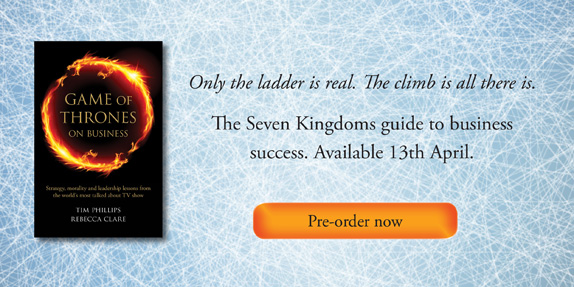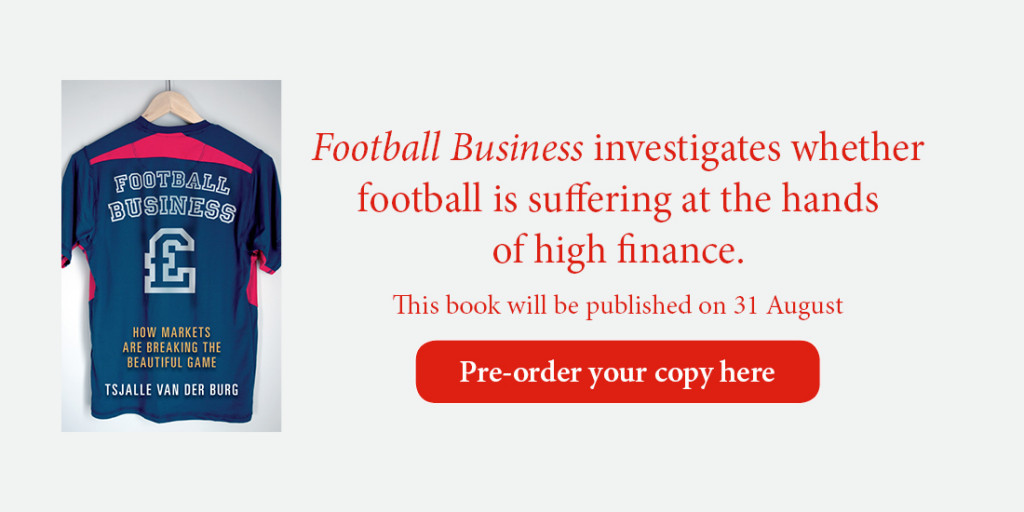Author Archives: Rebecca
What Machiavelli knew and Robb Stark found out: power is greatness
16 June 2014 by Rebecca in Business and finance, Entertainment, Game of Thrones on Business
Warning: this blog contains spoilers for Game of Thrones Season 3, Episode 9
I couldn’t watch the Game of Thrones episode featuring the ‘Red Wedding’ on the day it was first broadcast. For 24 hours I couldn’t read the tweets or posts from my friends which went like this:
Friend: WHAT THE HELL WAS THAT??!
Other friend: didn’t see that coming!
Other friend: I’m glad no one told me that [spoiler]…
 This stuff was hard to avoid. The Red Wedding more or less crashed the internet. So (spoiler alert) I managed to avoid knowing the full detail of the slaughter of heroic avenger Robb Stark and most of his remaining family. I could boggle afresh at the mass murder of men, women, children (born and unborn) and dire wolves. Next time someone describes a drunken wedding to me as ‘carnage’, I’ve got a handy visual reference.
This stuff was hard to avoid. The Red Wedding more or less crashed the internet. So (spoiler alert) I managed to avoid knowing the full detail of the slaughter of heroic avenger Robb Stark and most of his remaining family. I could boggle afresh at the mass murder of men, women, children (born and unborn) and dire wolves. Next time someone describes a drunken wedding to me as ‘carnage’, I’ve got a handy visual reference.
But the internet-crashing shock wasn’t fundamentally about death. There’s loads of it on TV. I recently watched Michael McIntyre’s chat show. His guests died every week.
It’s because (more spoilers here) we’ve invested in the revenge story of the Robb Stark and his family who, in Hollywood narrative terms, should clearly win their war against the Lannisters because that’s the way things are done in fairy stories. Therefore, when they get cut into small chunks at the Red Wedding, and fail epically as a result, it’s not the way things should happen. Consider:
- Robb Stark’s wise and mostly good father, who loved his kids so much that he even fathered an extra one while he was off having a war, was murdered by the Lannisters for political reasons. Therefore avenging him is a righteous quest.
- Lannisters are weaselly snivelling cheats who make Shakespeare’s Richard III look like Nelson Mandela.
- The Starks have an attractive macho mud-caked integrity. They recall the great Wigan Rugby League team of the late 1980s; not least because they sound a bit like them too.
- As a result the Starks do not dress in silly foppish clothes or wear ridiculous little crowns. Again, not like the nasty Lannisters.
Many of the stories we read, watch and tell, the religions and beliefs we follow, the news we watch and therefore the assumptions we make are based on the idea that virtue gets a reward. We build these stories into a ‘Great Man’ (it’s almost always a man) narrative, in which a few extraordinary people shape our destiny for the better. This was first expressed by the historian Thomas Carlyle in 1841, in his book On Heroes, Hero-Worship, and The Heroic in History, in which he wrote, ‘The history of the world is but the biography of great men.’
Niccolo Machiavelli, writing 300 years before him, had a rather more nuanced appreciation of the Great Man. When he wrote The Prince as a leadership manual for medieval rulers, he knew two things: first, that it really helps to get stuff done if you are perceived as great. He was less fussy about actual greatness or virtue – perhaps because he’d spent a lot of time around the Medici and Borgia versions of the Great Man. The second thing, as Machiavelli warns us towards the end of his celebrated book, is that ‘greatness’ is fundamentally about happenstance: being the right person, in the right place, at the right time.
And so he undermined the Great Man Theory before Carlyle created it. But we look for a neater story, that great men are fulfilling a destiny. The Starks must win because they deserve it. It also helps us to take orders if we believe that we follow people because they are not just powerful, but better than us in some way.
Great Man Theory underpins the modern idea of the hero CEO too. There is an economic theory known as ‘just desserts’ (in the US, ‘just deserts’) which argues that the financial rewards of the additional value created by an innovation or business should flow to the person who created it. Greg Mankiw, one of the greatest economists alive today, recently wrote a paper on this called ‘Defending the One Percent’. It’s easy to read, and argues, for example, that innovators like Steve Jobs deserved their extraordinary rewards.
There are two arguments against this. First of all, Steve Jobs didn’t design the products that Apple sells. Innovation is a team effort, involving thousands of deserving, hard-working people, some of whom get minimum wage.
Secondly, even if we think there might be a limited number of great men to reward, who exactly are they? Who gets the revenues from the iPhone? Is it the person who invented the iPhone, or the telephone, or the one who invented electricity, or who created outsourced manufacturing, or even the internet? Any one of them would have a legitimate claim on a piece of the action, and few of them profited anything like as much as Jobs.
Machiavelli knew that the necessary condition for becoming a Great Man isn’t to possess greatness according to some moral or intellectual standard (it might help, but looking at the people in Mankiw’s 1% it’s clearly not essential). The perception of greatness comes from the power, not the other way around. People have to think you’re going to win, or they won’t give you a chance to prove it.
But the Red Wedding reminds us (as does much of Game of Thrones) that, while this is a necessary condition of greatness, it’s not sufficient. You also have to actually win: history never even thinks about virtuous people without power, and soon forgets losers. So when our Great Man Theories are hacked to bits in front of our disbelieving eyes, it’s uncomfortable. But it’s a useful reminder of the sources and limits of power.
You might also like: What Game of Thrones tells us about corporate inbreeding; Why Game of Thrones is better than PowerPoint.
World Cup 2014: will goal-line technology stop injustice in football?
13 June 2014 by Rebecca in Business and finance, Football Business
By (a currently very happy) Tsjalle van der Berg, author of Football business
Right at the beginning of most John Grisham books, a person appears who is confronted with circumstances which completely disrupt his happy life. Sometimes this is mainly bad luck, but often serious injustice is done. And then the person starts to fight the injustice, making the story a bestselling one. As an economist, I like that; high sales are good for the economy, and for employment too. Yes, injustice brings many good things – thanks to the hero who fights it of course.
Grisham is an open-minded man, but as a writer he refuses to have any discussions with the characters in his book. He simply does not listen to them. That’s good, because his heroes would tell him injustice should never be tolerated. This is how real heroes think. So if Grisham did what his heroes wanted, there wouldn’t be any injustice at all in his books – not even at the beginning. That would damage book sales. So Grisham is doing the right thing, in my view.
During the round of 16 match between England and Germany at the 2010 World Cup in South-Africa, the referee did not award a goal when Frank Lampard’s shot crossed the line. And so England lost. Yes, great injustice was done! In the media, many well-known players and coaches protested and pleaded for goal-line technology to assist the referee in such cases of doubt. Good. Our football heroes are examples for people all over the world, and they should make it clear that fairness is good.
 But players and coaches are no more than characters in the book called ‘Football’. The author of that book is FIFA. This author has, unlike John Grisham, recently listened to the characters in its book. And so the present World Cup has goal-line technology, which will make the game more just, but arguably less exciting to watch.
But players and coaches are no more than characters in the book called ‘Football’. The author of that book is FIFA. This author has, unlike John Grisham, recently listened to the characters in its book. And so the present World Cup has goal-line technology, which will make the game more just, but arguably less exciting to watch.
Of course, FIFA president Blatter can argue he is not only a writer, but also a character in the book called ‘Football’ – so he should set a good example for children too. And children will understand that the new technology is fair. But if this is Blatter’s argument, why is FIFA itself so corrupt? Why does it let big sponsors make money while the poor in Brazil suffer as a result? What kind of examples are these? If FIFA really wanted to fight injustice, video replay for referees should not have been its first priority.
Anyway, we have to face it: technology has become part of the game. But I still remember that match between England and West-Germany in 1970, at the World Cup in Mexico. The match was thrilling even before it started, as the Germans wanted revenge for that highly debatable English goal at the World Cup final at Wembley four years before. Hopefully, England will meet the Germans during the elimination stages of the current World Cup, in Brazil. If so, everyone should watch that one special game. It will be the first World Cup in which footballing heroes can expect real justice in undoing the injustices of the past. Now all England needs is for Lampard to score that same goal again!
Take a walk on the wild side for the sake of your health
11 June 2014 by Rebecca in Business and finance
By Kate Cook, author of The Corporate Wellness Bible
Exercise doesn’t have to involve sheathing yourself in Lycra and pounding mindlessly to hip-hop backbeats in front of banks of TV screens. In fact, according to The Guardian, a recent report by the Ramblers and Macmillan Cancer Support discovered that walking for half an hour a day five days a week could save 37,000 lives a year and lead to a reduction of almost 300,000 in the number of cases of type 2 diabetes, it can even make weight-loss easier.
For centuries, the daily constitutional (walk) was the best way to stay in peak condition whilst at the same time gaining a bit of perspective on life. In many ways it still is.
Walking can mean more than popping out to the corner shop for twenty Marlboro. Why not take a chance on adventure walking? Even if you only plan a walking weekend every so often – a special weekend in the country once or twice a year – it will inspire you for the smaller everyday stuff like getting out to the park or walking to work. You will need to make sure you have your ducks in a row before you start. I’m talking about finding some great countryside and going for it, but making sure you’re kitted out with the right gear before you set out. It’s unlikely you’ll kick off with a life-or-death hike across the Arctic tundra, but wherever you are, you do need to spare a thought for your safety.
Equipment for your own miracle
One of the first steps to take (excuse the pun) is to make sure that you have all the right gear. And great wet-weather gear is a must. I’m not talking fisherman’s yellow galoshes and capes – these days you can get very light wet-weather gear that will fold up and fit into your pocket. Don’t just get the top, invest in the trousers as well – you’ll thank me for this one day, as there’s nothing worse than being in the middle of nowhere with wet, cold and soggy trousers and no chance of changing them for the next 50 miles. There’s no such thing as bad weather, just inappropriate gear!
The second vital bit of kit for your proper walking experience is the right boots. Remember that you could well have thick socks to allow for so don’t buy them too small. Talking of socks, it’s worth getting proper walking socks. A good outdoor shop should be able to advise you on the right kind of boots and socks for you. The boots need to be protective of the ankles, waterproof and not too heavy. They also need a good grip – the proper lace-up ones are ideal (check out www.snowandrock.com).
 The other essential piece of kit is your rucksack or daypack. Choose one with a middle strap that goes round your tummy as this will help to protect your back. These days there are rucksacks that make sure the material isn’t next to your back so you don’t get too sweaty carrying it. Make sure you get one with loads of pockets for maps, bits of string, etc. Also make sure you have basic survival gear: matches (in a little plastic bag so they’re not soggy when you need them), a Swiss army knife, foil blankets, water bottles, oatcakes, nuts and maybe some dark chocolate (temperature permitting). Also, pack a whistle just in case you need to attract attention. And a hat, good sunglasses and some sunscreen. A map is always a good idea, as long as you can read it! And you’ll need to carry at least a litre of water. Obviously in boiling temperatures you’ll need more. Don’t forget to pack a small medical kit that includes some rehydration sachets (electrolyte formulas) and some plasters for those pesky blisters.
The other essential piece of kit is your rucksack or daypack. Choose one with a middle strap that goes round your tummy as this will help to protect your back. These days there are rucksacks that make sure the material isn’t next to your back so you don’t get too sweaty carrying it. Make sure you get one with loads of pockets for maps, bits of string, etc. Also make sure you have basic survival gear: matches (in a little plastic bag so they’re not soggy when you need them), a Swiss army knife, foil blankets, water bottles, oatcakes, nuts and maybe some dark chocolate (temperature permitting). Also, pack a whistle just in case you need to attract attention. And a hat, good sunglasses and some sunscreen. A map is always a good idea, as long as you can read it! And you’ll need to carry at least a litre of water. Obviously in boiling temperatures you’ll need more. Don’t forget to pack a small medical kit that includes some rehydration sachets (electrolyte formulas) and some plasters for those pesky blisters.
Put actual dates in your diary and organise to go walking with friends. Going on long walks can seem quite scary if you’re new to them and can’t read a map, but the gear is only necessary if you’re going to take the whole thing seriously as obviously short walks in the countryside on designated footpaths don’t need full-on survival gear. Always take water with you, however!
Take a holiday that includes guided walks in wonderful countryside. Lots of companies offer this sort of thing now: try www.atg-oxford.co.uk, which offers walks for all levels of fitness and experience. Also check out www.walksworldwide.com and www.theultimatetravelcompany.co.uk.
Why Game of Thrones is better than PowerPoint
9 June 2014 by Rebecca in Business and finance, Entertainment, Game of Thrones on Business
If you’ve never watched Game of Thrones, you may be missing out on more than mere entertainment. Maybe it’s because you don’t really like stuff about wizards and orcs. Don’t worry: no wizards or orcs in Game of Thrones. Granted there are a couple of dragons, although they aren’t in it much. But that’s not the point. Regardless of your feelings on dragons, with Game of Thrones, as with so much in life, you stay for the stories.

First off – I totally get it. When I was at school, the geeky kids used to play a board game called Dungeons and Dragons, which was like computer games would be if no one had invented electricity. I sat in once, and it confirmed my wish to stamp on the dungeonmaster’s glasses after everyone else went home.
Fast forward 30 years, and I’m glued to Game of Thrones every week. Is this because I’ve successfully dealt with my anger issues, or are the dragons just better these days?
Clearly I’m more tolerant of things that couldn’t ever really happen but are fun to think about, having had my mind unexpectedly expanded by authors such as Alan Moore and Peter Ackroyd. And Game of Thrones isn’t short of mind expanding situations. There are seven kingdoms full of people cheating, fighting, having sex, fighting the people they just had sex with, cutting off those people’s heads, cheating some more, fighting the people who still have heads who are angry because they got cheated, … you get the hang of it. Sometimes the writers bump off the most important character, just to make us go WHAT?
Game of Thrones gets confusing the moment you stop concentrating or nip out to make a sandwich, but I rather enjoy that bit. I am constantly thinking, ‘Hang on, I thought he had been tortured to death in the local brothel last week’ or ‘Is that woman he’s having sex with his cousin or his great aunt?’ These thoughts remind me, perhaps somewhat alarmingly, of an adolescence spent in Odin’s discotheque in Driffield. That was the 1980s, kids. In many ways Game of Thrones recalls that era: a tendency to big hair and shoulder pads, no mobile phones, Charles Dance.
But I digress; trying to make sense of little mysteries should be one of the great pleasures of our adult lives. It is literally what makes us human. As the biologist William Calvin explains in a 2006 paper on ‘The emergence of intelligence’:
Our abilities to plan gradually develop from childhood narratives and are a major foundation for ethical choices, as we imagine a course of action, imagine its effects on others and decide whether or not to do it.
In Odin’s, as in Game of Thrones, most of the time the response was, ‘Let’s do it, what’s the worst that could happen?’
So, we do not learn by being told, but by doing and observing, and working out what happens next. We learn by creating a story out of experience. But, when we grow up and go to University and then get an office job, what does the world give us to make sense of life?
PowerPoint, that’s what.
PowerPoint is anti-story. We go into a room. Someone reads out 30 slides which all seem to be lists. Sometimes the lists magically appear, point by tedious point: as suspenseful as watching a tap drip. Sometimes the lists have little sublists, which have their own titchy sub-sublists. The titchy lists are in italics. No one tells you why. Sometimes there will be important diagrams which pretend they tell a story, but MAKE NO SENSE.
A proper story has what Chris Anderson, the man who created TED talks (and therefore a man who knows about storytelling) calls the ‘aha moment’: the pleasure when we work something out for ourselves, when we realise something without someone telling us it. The fog lifts.
Jokes have this structure, conversation has it, sport has it, walking into a bar and choosing a beer has it, even shopping on Amazon has it. Game of Thrones has it in seven kingdoms, all at once. Presentations do not, because the people who write them don’t bother to put it in. You’ll learn far more about your co-workers from Game of Thrones than you will from a dozen teambuilding seminars.
Being confused for a while is fun, because it’s more satisfying. Presentations are worse than real life, because they take out the stories, the bits that help us work it out for ourselves. If you present to me and there’s no aha moment, you know what I will be thinking: I’d like to stamp on that presenter’s glasses. And if that sounds like negative feedback, it’s better than what happens to most of the characters in Game of Thrones.
You might also like: What Game of Thrones tells us about corporate inbreeding; What Machiavelli knew and Robb Stark found out.
Everybody’s talking about … Business Ecosystems
6 June 2014 by Rebecca in Business and finance
We all know what business is and most of us have at least a vague ‘High School Biology’ idea what an ecosystem is but is there any merit in putting them together or is it just another example of a lame metaphor being stretched, pulled, plucked and pinned to make it applicable to business?
 Where did it come from?
Where did it come from?
The term business ecosystem was coined by James F Moore in an article titled ‘Predators and Prey: A New Ecology of Competition’ which appeared in the Harvard Business Review in 1993.
The article won the McKinsey Award for best article of the year, no doubt encouraging Moore to write a whole book on the subject – The Death of Competition: Leadership and Strategy in the Age of Business Ecosystems.
But what does it mean?
According to Moore a business ecosystem is, ‘an economic community supported by a foundation of interacting organizations and individuals – the organisms of the business world. The economic community produces goods and services of value to customers, who are themselves members of the ecosystem. The member organisms also include suppliers, lead producers, competitors, and other stakeholders.’
A biological ecosystem is made up of various species, the relationship between those species, the health of the species and how they interact with and affect each other, as well as how they are affected by the environment etc. Business ecology is supposedly similar, only the species are customers, markets, products, processes, businesses, stakeholders and governments.
However, as with most business jargon when you really think about the phrase or term it almost always states the obvious. Business by definition is a collection of people, processes, resources and other businesses that come together to create value and deliver a product or service. Sure, it may be marginally similar to a biological ecosystem which explains a community or network of living organisms and non living components that interact as a system but it’s tenuous at best.
Moore does his best to extend the metaphor by urging business to seek ‘symbiotic’ relationships and to ‘coevolve’ both in terms of their capabilities and roles but also in terms of their environment and other businesses. He stresses that, ‘the particular niche a business occupies is challenged by newly arriving species.’ Well no shit Sherlock!
Where can I find a business ecosystem?
Initially you could find this little nugget of wisdom in mainstream business but numbers of executives willing to look like a muppet are dwindling. Today the term has retreated to the rarefied atmosphere of IT where the term itself has coevolved and become widely adopted by the high tech community. A shift greatly assisted by economics professor J Bradford DeLong’s explanation that ‘business ecosystems’ describe ‘the pattern of launching new technologies that has emerged from Silicon Valley’.
He went on to define business ecology as ‘a more productive set of processes for developing and commercializing new technologies’ that is characterized by ‘rapid prototyping, short product-development cycles, early test marketing, options-based compensation, venture funding, early corporate independence’.
On one hand this redefined interpretation of business ecology is certainly more definite and potentially useful to at least some parts of business but what the new definition of business ecology actually has to do with the accepted understanding of either business or ecology is less obvious.
Are there any ways I can make use of the term?
Not many! Because of the change in meaning over time it’s probably safer not use it at all. Besides it’s just pretentious!
Business by definition is the coming together of suppliers, distributors, customers and processes as well as the navigation of competitors, regulators and governments to deliver value. Most people in business already know that so giving that a new name beyond ‘business’ seems completely unnecessary.
That said, if your ethical compass is more than marginally off true north and you want your business to look a little ‘greener’ that it really is then it may be a useful phrase to hijack!
While some environmentalists have used the term as a way to talk about business sustainability and the environmental impact of business rather than a metaphor to describe the increasing complexity of relationships inside and outside business other environmentalists believe the use of the word ecosystem is just a smokescreen and a copout. Instead of taking environmental concerns seriously many believe that the use of ‘business ecosystem’ simply allows business executives to pretend they lie awake at night worrying about the polar ice caps when all they are really doing is cashing in on the environmental and sustainable gravy train.
Everybody’s talking about … Leverage
30 May 2014 by Rebecca in Business and finance
For many defenders of the English language this poor, unsuspecting word is the grandfather of nouns converted into verbs for the convenience of business. But should we allow it to continue to be pimped out to the dim and lazy or at least try to rehabilitate it as a noun?
Where did it come from?
It was Archimedes who said, ‘Give me a lever long enough and a fulcrum on which to place it, and I shall move the world.’ Archimedes was an ancient Greek mathematician, physicist, engineer and inventor credited with the explanation of the lever and the invention of a screw pump still used today – the Archimedes screw.
Clearly, he was a smart guy and he’d probably be spinning in his grave like a ceiling fan if he knew his wise observation had been corrupted by mediocre business executives intent on looking more competent than they really are.
When it made its way into business speak is unknown, and who we should blame for it is equally obscure.
But what does it mean?
Leverage is used to imply an assisted or additional advantage. In the same way that Archimedes could move something immovable with the help of a strategically positioned lever, business believes it can move profit upward by a strategically positioned ‘leveraged’ advantage. Or at least the executives in question believe a rousing speech on leveraging assets might help.
 In many ways it’s a tautology like ‘added bonus’ or ‘free gift’. A bonus is by definition added or extra so the addition of added is meaningless. A gift is by definition free so the addition of free is unnecessary. Using leverage to explain the exploitation of a strategic or tactical advantage in business is also meaningless and unnecessary because by definition that’s what business is supposed to be doing in the first place. If a business has a nifty IT system, a patented design or particularly smart engineers surely it would be plain stupid not to take advantage of those things.
In many ways it’s a tautology like ‘added bonus’ or ‘free gift’. A bonus is by definition added or extra so the addition of added is meaningless. A gift is by definition free so the addition of free is unnecessary. Using leverage to explain the exploitation of a strategic or tactical advantage in business is also meaningless and unnecessary because by definition that’s what business is supposed to be doing in the first place. If a business has a nifty IT system, a patented design or particularly smart engineers surely it would be plain stupid not to take advantage of those things.
That said, leverage is also used as a specific finance term for any technique to multiply gains. Also known as gearing, it usually involves borrowing money to buy additional assets in the hope those assets will yield more profit than the cost of borrowing the money. Obviously this doesn’t always pan out so the losses rather than gains are often multiplied.
This dichotomy of meaning leads to the utterly ridiculous possibility of leveraging the leverage!
Where will I find leverage used?
This particular gem of business jargon is extremely versatile and can be found in meetings, reports and presentations across business, from finance (where it may actually be a meaningful term) to marketing, strategy and even shareholder meetings. It needs to be stamped out.
For example, when a CEO addresses a shareholder meeting and expresses his intention to, ‘leverage our significant investment in IT infrastructure across all the business units to drive profits and increase market share’, rather than nodding enthusiastically at this gibberish the shareholders should throw a few eggs and respond, ‘well I should hope so, otherwise why make the significant investment in the first place!’
How can I leverage my advantage?
The ‘beauty’ of the word leverage and the reason it is so popular in business is that it sounds good but means very little. It can be used to replace just about any activity verb. And, like so much of the worst business jargon it’s passive. It’s therefore easy to see why it’s wheeled out so often.
So if you have a report to write but you’ve not really done what you were supposed to do by the time you were supposed to have done it then ‘leverage’ is a fantastic little word that can get you off the hook. If you are ‘leveraging a project’, the reader has no way of knowing whether you’ve barely started it, almost finished it or palmed it off to someone else who is ignoring it! It’s particularly useful for speculative documents such as business plans and project proposals because it’s so vague. Plus it’s almost always accompanied by the unspecified ‘we’ not the specified ‘I’, thus enabling its user to abdicate all responsibility or accountability for the actual leveraging.
As a result of these special obfuscatory qualities the word leverage is incredibly useful for corporate minions eager to look good but do as little as humanly possible. It allows for non specific, passive inference of action occurring without saying what that action is, who is taking that action or when said action will be completed, and therefore implied value realised. In practical terms it allows subordinates to report on progress while still allowing the realities of a project to actually run the project. So much so that if you see a report, update or article that contains the word leverage you can pretty much guarantee that nothing is happening or that whatever is happening is happening a great deal slower than anyone could have thought possible.
Unless you are specifically talking about financial leverage or borrowing money to capitalise on an opportunity that could increase value then avoid the term. At the very least ‘leverage’ should remain a noun (as in ‘to apply leverage’) and not be pimped out as a passive pseudo-verb (as in ‘we are leveraging our infrastructure’). And whatever you do don’t do what one company did in 2001 when it made people redundant and told them the business was ‘leveraging their synergies’.




